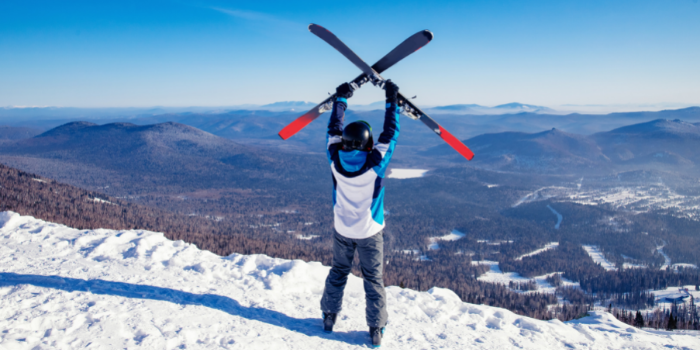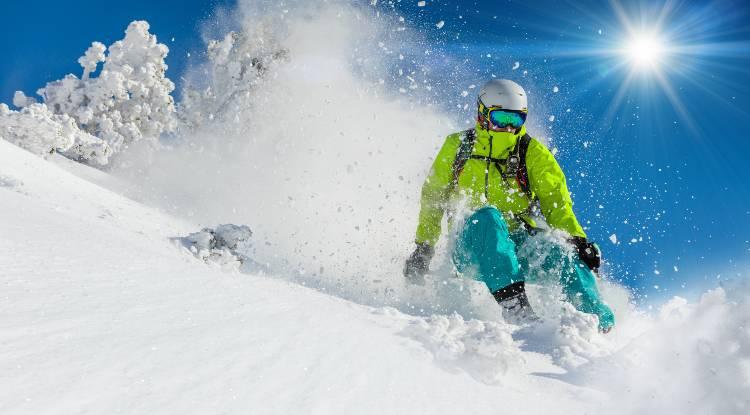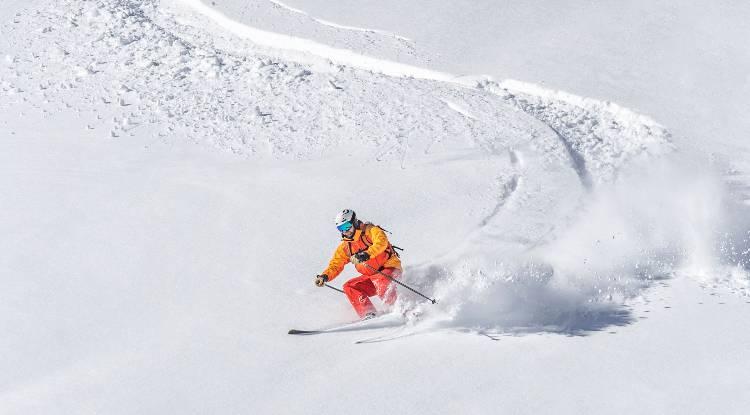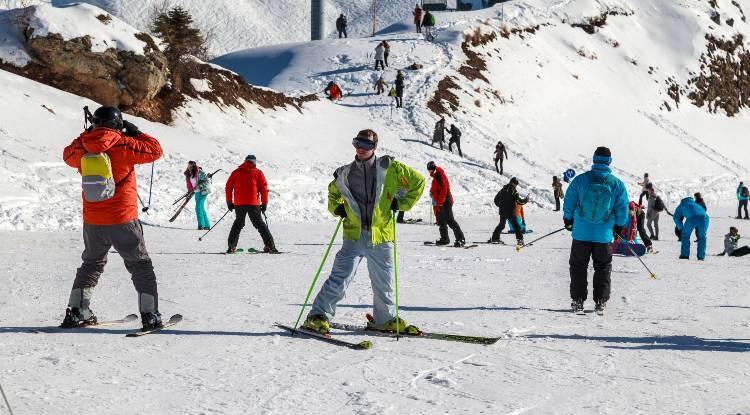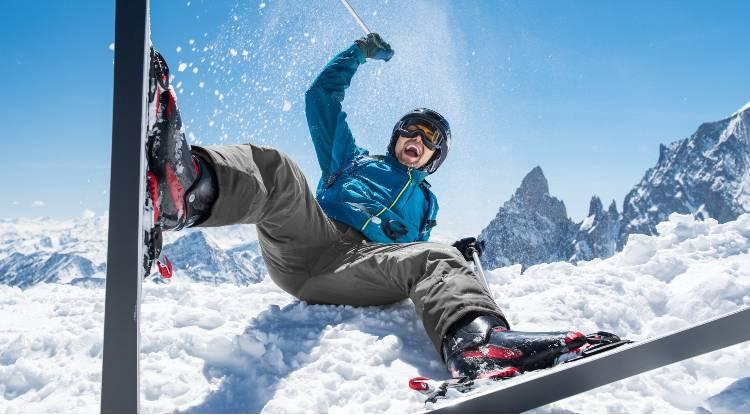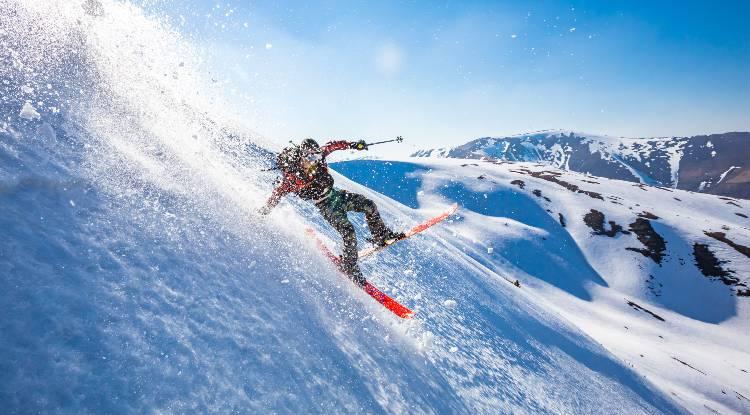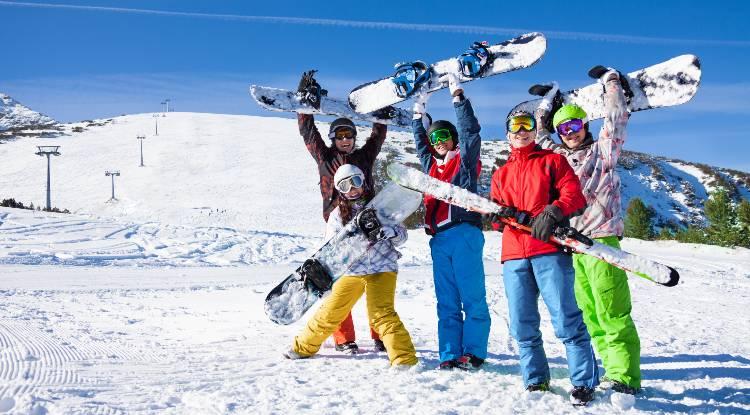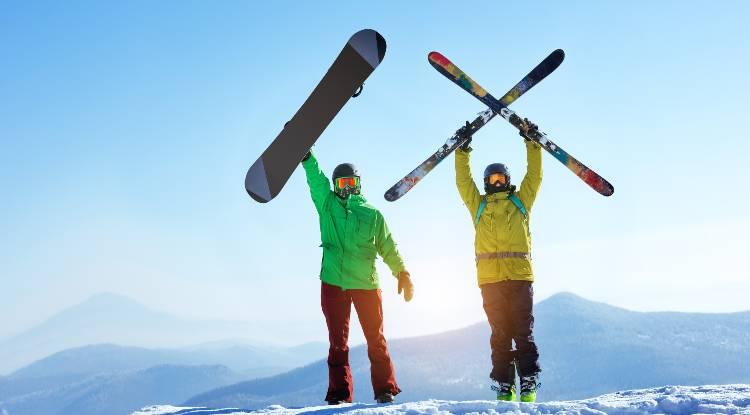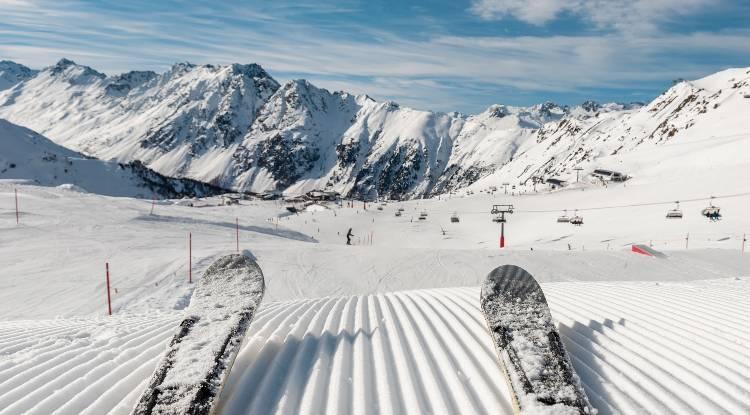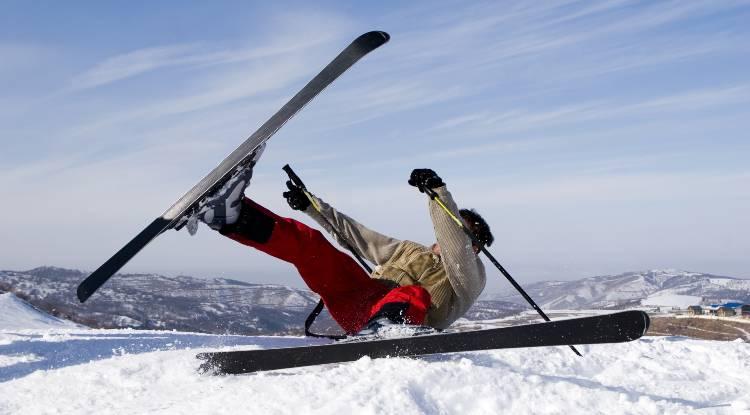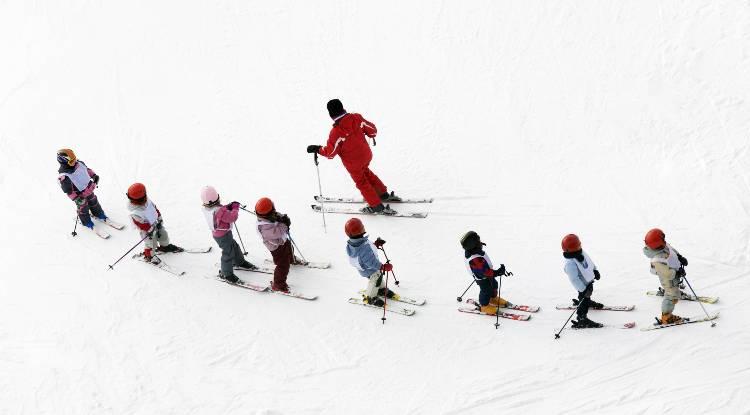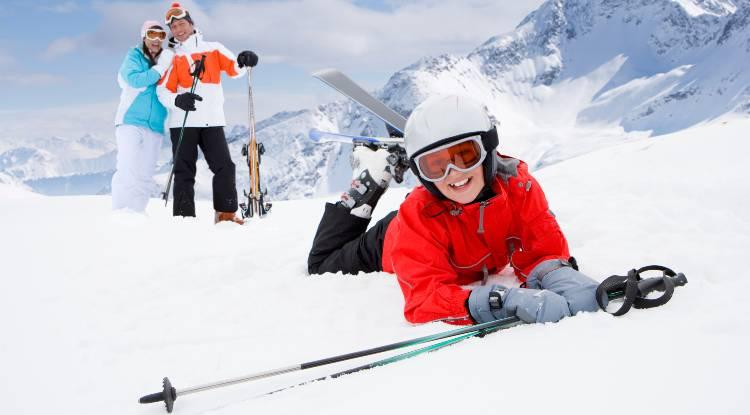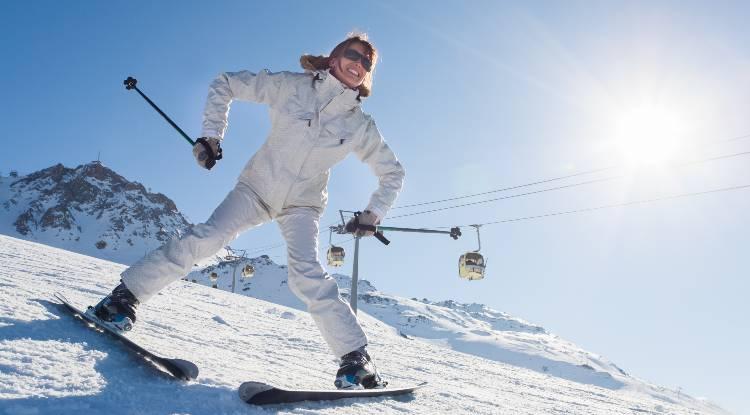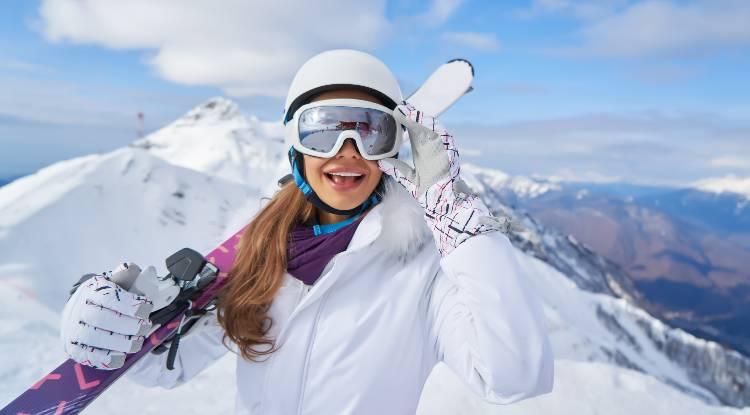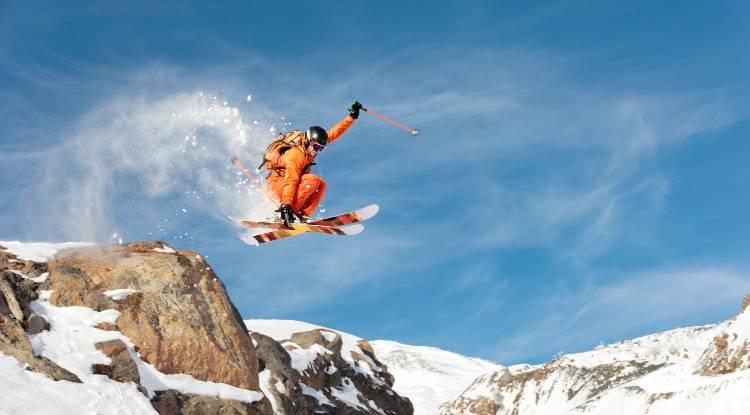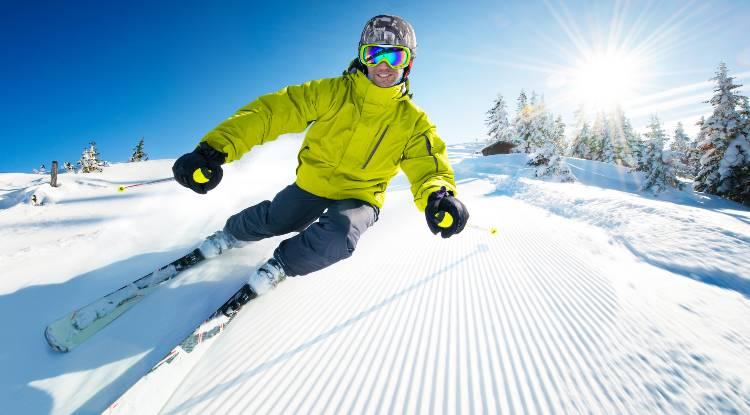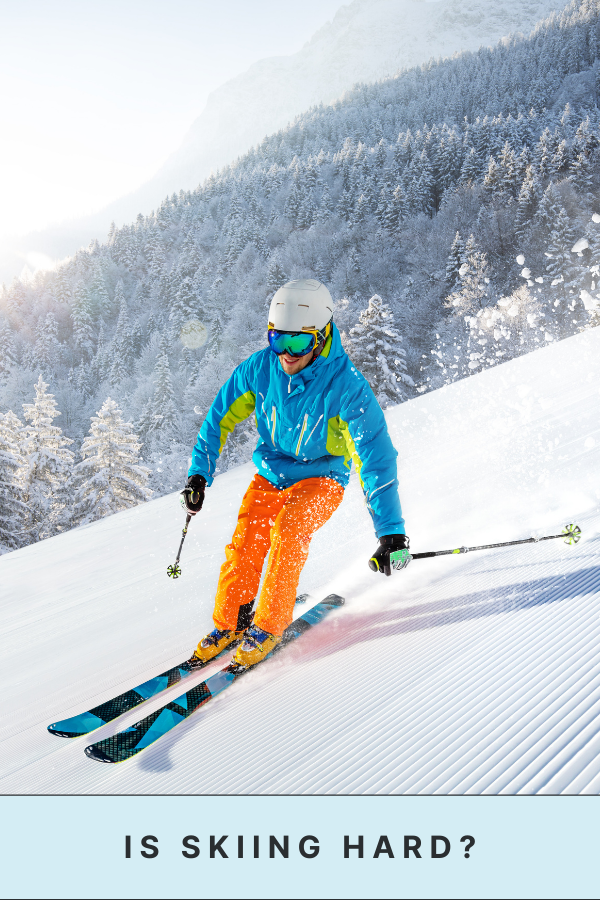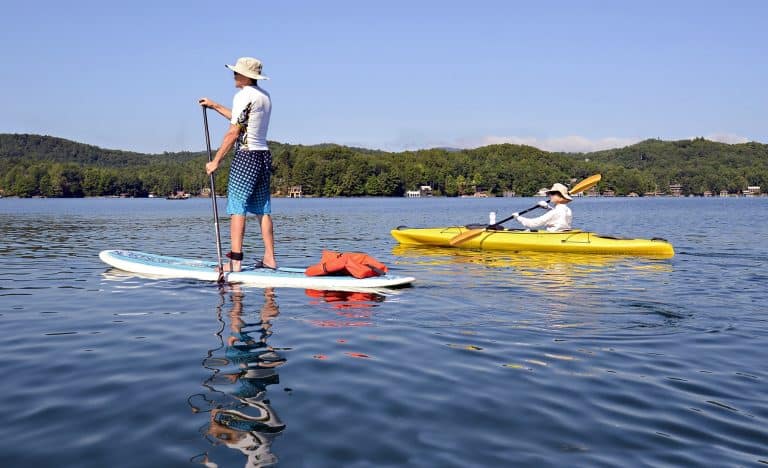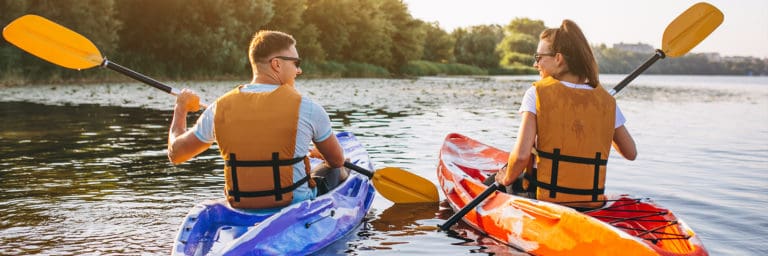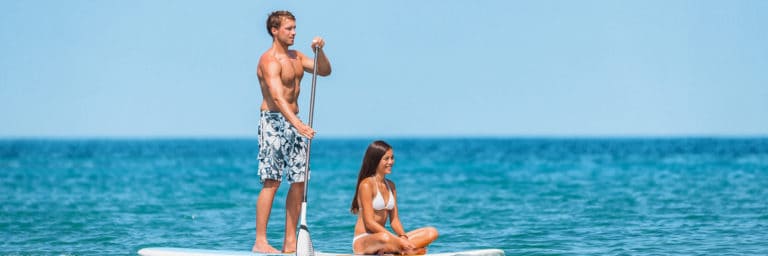For people with no experience at all, learning how to ski can be intimidating. It is hardly surprising when you think of what is involved and when you hear of people’s skiing horror stories.
The uncertainty of learning how to ski comes from the unknown, putting some people off. This is especially the case if they are not sporty.
However, in this post, we will give you lots of information that will hopefully put your mind at rest. We will also give you lots of tips so your first time skiing is as enjoyable as it can be.
Image by Lukas Gojda from Shutterstock
Is Skiing Hard?
Image by MWiklik from Shutterstock
How easy you find skiing will depend on a few things. Some people pick it up quicker than others, but you need to be realistic about what you will achieve during your first ski trip.
The people who pick up skiing quickly tend to be sporty and have a good fitness level. If you are unfit or not sporty, you may find learning to ski more difficult, but it isn’t impossible, so don’t be put off.
Generally, people will be able to get around easy slopes just a few days after picking up the basics on the bunny slopes. However, skiing requires some real commitment to master and become good at.
Once you get to the intermediate stage, you will realize that there are many different techniques to perfect. But when you can put them all together, you can have some of the most incredible experiences of your life.
When you compare learning to ski with learning to snowboard, it has the exact opposite learning curve. Snowboarding takes a few days of falling over and rolling around in the snow. But once you get past this stage, it is much easier to become a good snowboarder.
How Long Does It Take To Learn How To Ski?
Image by evgenii mitroshin from Shutterstock
Putting a time frame on how long it will take a person to learn how to ski is difficult. Everyone learns at a different pace, so you can’t really say, “it will take X weeks to learn how to ski.”
Factors that determine how fast you learn to ski include your motivation, physical fitness, ability to adapt, sporting background, and how you embrace the experience.
Typically beginner skiers manage to link turns down the mountain within the first three days. However, it takes an additional one or two days to be proficient enough to ski blue runs on their own.
What Is The Hardest Thing About Learning To Ski?
Image by Rido from Shutterstock
The hardest part of learning to ski is coordinating both skis and learning edge control. These are tricky to master, but they are the basis of all skiing maneuvers.
You will first learn how to snowplow, a fundamental skill that involves putting your skis into a wedge-shaped formation. Your ski tips are close together, while the tails are wide apart, preventing you from picking up too much speed.
It is possible to turn while snow plowing, but you will soon move onto parallel turns. This is when you turn with both skis parallel to each other, requiring coordination and understanding of using your skis’ edges.
As a beginner, you may find that how quickly you pick up speed is really scary. This is understandable, as you haven’t yet developed the skills to control your speed.
Once you get over the fear and manage to put together some quality parallel turns, you will be able to move away from the bunny slopes and onto the blue runs.
Some people also find getting on chair lifts challenging. But the key is to relax and not panic. All you need to do is sit down at the bottom and stand up and ski away at the top.
But as a beginner skier, you will be on the bunny slopes. These are usually serviced by conveyor belt-style ski lifts, known as magic carpets. They are also serviced by drag lifts that you just hold onto as it transports you up the hill.
How Dangerous Is Skiing?
Image by Taras Hipp from Shutterstock
There are dangers to every sport, but the faster you go, the higher the risk. Therefore, skiing comes with its dangers, but it is statistically safer than road cycling or football.
If you are a recreational skier, your risk is not exceptionally high. When you move onto more advanced skiing such as freestyle, backcountry, and taking on challenging runs, skiing becomes more dangerous.
There are several ways to manage the risk and stay safer while skiing. For example, always wear a helmet, and get some instruction.
The best way to stay safe on the mountain is to use common sense. This involves not skiing beyond your ability and paying attention to what is happening around you.
Many accidents can be avoided by simply checking behind you before you set off, reading the terrain ahead of you, and being sensible.
But falling is part of skiing, no matter what your skill level. During these formative early days, you will spend quite a lot of time on the ground, but this is how you learn.
Is Skiing Harder Than Snowboarding?
Image by Sergey Novikov from Shutterstock
As we mentioned before, skiing is much easier to pick up as a beginner than snowboarding. A beginner skier can be sliding down a bunny slope without too much trouble within a few hours.
Getting to this stage as a snowboarder can take two or three days. But to progress as a skier, you need to put in lots of commitment and work to refine the techniques.
You can ski all your life and look like a bad skier. But you can look like you know what you are doing on a snowboard in just a few trips to the mountains.
Should I Take Up Skiing Or Snowboarding?
Image by Dmitry Molchanov from Shutterstock
Both skiing and snowboarding are great fun, but which one you choose will depend on your personal preference and your sporting background. Where you want to spend your mountain time will also make a difference in which one you choose to do.
The topography of the ski area can make snowboarding awkward if it has lots of flat sections. If this is the case, becoming a skier may be preferable, as you can use your poles to keep moving.
Another factor that may sway your decision is your group of friends. If you are all beginners, you will be able to learn to ski or snowboard together.
If you are joining a group of already proficient skiers, you may be better off learning to ski over snowboarding.
Snowboarding can be awkward if you are on the mountain with your kids. The fact that you can skate or pole along makes skiing with kids much more manageable than snowboarding.
Is Skiing Expensive?
Image by Gorlov-KV from shutterstock
Skiing has a reputation for being expensive. This comes from all the equipment and clothing you need and where you can do it.
The list of equipment and clothing you need to ski is extensive and includes:
- Skis
- Poles
- Boots
- Bindings
- Ski jacket
- Ski pants
- Mid-layer
- Thermal underwear
- Ski socks
- Helmet
- Goggles
- Sunglasses
- Gloves
- Alternative clothing options to suit the conditions
Most people need to travel to the mountains to ski, which can be a significant cost depending on how far you travel. But once you arrive, you need somewhere to stay, which can be pricey in some ski resorts.
These costs can easily put people off even trying skiing. But, there are ways to manage the costs to make skiing more affordable.
As a beginner skier, you won’t need to buy your own ski equipment. It makes more sense to rent your gear when you get to the resort.
The next thing you need to buy is a lift ticket. In some U.S ski resorts, this can amount to several thousand dollars for just a few days.
These costs can easily put people off even trying skiing. But, there are ways to manage the costs to make skiing more affordable.
As a beginner skier, you won’t need to buy your own ski equipment. It makes more sense to rent your gear when you get to the resort.
Rental equipment is usually pretty good these days, but you won’t need anything too fancy at this early stage. You will need a pair of short flexible skis to make everything much more manageable.
Once the skiing bug bites you and you want to do more, you may want to buy your own equipment. It is at this point you will want higher quality stuff, more suited to your ability and the type of skiing you want to do.
Can You Teach Yourself To Ski?
Image by Julia Pivovarova from Shutterstock
You can learn any sport to a point without lessons. However, it is not advisable to teach yourself how to ski.
If you head up the mountain on your own with no experience or clue what you are doing, you may regret it. The first danger of doing this is that you can injure yourself badly.
Injuring yourself on a ski trip is unfortunate, but it is also expensive. You need to get patched up, and you have ruined a journey you have paid for. Therefore, you have paid for your lift ticket, ski rental, hotel, etc., for nothing.
The next issue with teaching yourself (if you come away unscathed) is that you will pick up bad habits. Bad habits are hard to break, so it is better to start off with the proper techniques in the first place.
Of course, ski lessons are primarily there to give you the skills to get down the mountain safely in a way you enjoy. But they give you much more than this.
A ski instructor will ensure you go to the safest places on the mountain for your ability. They will also teach you about mountain etiquette, ski lifts, how to find your way around, and how to fall safely without injuring yourself.
Ski instructors are not just great skiers; they are great instructors too. They have been on many courses and have lots of experience that has developed excellent teaching techniques.
A ski instructor can adapt their teaching style for you to get the best results from your lessons. This makes taking a skiing lesson an excellent idea.
If you don’t take skiing lessons, it is dangerous for you and the people around you. Most serious skiing injuries involve people crashing into each other, and unfortunately, often involve beginners.
This should not put you off going skiing, though. We mentioned managing risk earlier, and taking lessons is the primary way we can do this.
What Can I Expect From Ski Lessons?
Image by Diego Cervo from Shutterstock
During your first ski lessons, your instructor will focus on how to slow down and stay in control. They will also teach you how the mountain and ski resorts work, as it will be an alien world to what you know right now.
Your ski instructor will go through all the jargon during your lessons. You will learn the color grading of the slopes and what the maneuvers are called.
A good ski instructor will also stoke your enthusiasm by encouraging you and introducing you to the aspects of mountain life. They will support you every step of the way, which will help you progress much faster than if you tried to teach yourself to ski.
Can My Friend Teach Me To Ski?
Image by ”‹”‹Juice Verve from Shutterstock
A more experienced friend may offer to teach you to ski, and you may be tempted to take them up on their offer. This is not a good idea.
Your friend may have some bad habits they are unaware of and pass them down to you. Also, even if they are a great skier, they may not be a good instructor; this can cause frustration and have you cursing that you didn’t just book a proper lesson.
Your friend may get frustrated and talk you into skiing a slope that is unsuitable for your ability. This can be very dangerous, and it will cause arguments, potentially ruining your ski trip.
The other issue with learning from a friend is that they could be missing out on valuable mountain time. If they miss a powder day to coax you down a bunny slope, their heart won’t be in it. Also, do you really want to be that person to take them away from the powder?
Tips For Beginner Skiers
Image by plprod from Shutterstock
With all this said, hopefully, you are still up for heading to the mountains this winter. If so, here are some tips to make your first ski trip the best it can be:
1. Choose A Suitable Ski Resort
You don’t need a vast ski area to explore as a beginner skier. At this stage, when it comes to the mountain, you need a good selection of easy slopes to get to grips with skiing.
However, if you are in a group with mixed abilities, you need to ensure there is enough for everyone.
Some ski resorts have ski lifts that are free to use for beginners. This will significantly reduce the costs of your trip.
You also need other things to do off the mountain. There will be days when you are just too tired to ski; therefore, having something else to do is a good idea.
Alternative activities in a ski resort include dog sledding, snowmobiling, paragliding, snowshoeing, and spa days. Don’t forget that après is a big part of skiing for many, so choose a resort with a good après scene for the full experience.
2. Don’t Overdo it
It is common for beginner skiers to do too much and push themselves too hard. You don’t need to be over-cautious, but be realistic about how far you push yourself.
You also need to listen to your body. It is very easy to injure yourself when tired, so when you start making silly mistakes, finish your day and save it for tomorrow.
3. Layer Up
If you wear proper ski clothing, you will be comfortable and safe in pretty much any alpine weather. Therefore, you need to pack the appropriate clothing for your ski trip.
Most people dress in three layers. This starts with a base layer of thermal underwear that wicks moisture away from your skin.
Next, you have a mid-layer that will insulate your body. This will usually be a fleece, thin puffer jacket, or even a hoodie.
Your outer layer should consist of a waterproof and windproof jacket and pants. They should also be breathable to allow moisture to escape.
For ultimate waterproofing and breathability, you could get Gore-Tex clothing. However, this stuff is pretty expensive, so you may want to opt for cheaper options that still perform pretty well.
4. Fuel Yourself For The Mountain
Skiing is a very active sport, especially for beginners. Therefore, you need to make sure you have enough energy for the day.
It is best to have a good breakfast before you head out onto the mountain. But you should also stay fuelled and hydrated throughout the day.
Stuff your pockets with snacks, or carry a backpack or hydration pack. This way, you can have a bite or a sip whenever you need to.
5. Hit The Gym Well In Advance Of Your Trip
The truth is, the fitter you are, the more fun you will have skiing. With a good level of fitness, you will find learning to ski easier and less stressful; you will also get more out of it.
So about six weeks before your trip, start doing some exercise. You should focus on cardiovascular fitness, upper body, lower body, and core strength.
Improving in these areas will give you more stamina and allow you to react accordingly to changes in the snow. You will also benefit from improved flexibility. With this in mind, you should do some yoga and Pilates.
7. Protect Your Eyes
Image by Zoom Team from Shutterstock
The sun reflects off the snow creating a super-bright glare. This is incredibly uncomfortable for your eyes and can badly damage them.
To prevent snow blindness, you should always wear sunglasses or goggles while skiing. The lenses also enhance your vision, so you can stay safe and find the best snow on the slope.
8. Wear Sunscreen
The snow can make the UV rays from the sun 70% stronger. Therefore, you need to wear sunscreen on your exposed skin while skiing.
Make sure you put it on the back of your neck and your nose, as these are the parts that get the most exposure.
9. Don’t Ski On Your Own
If you are not with an instructor, don’t ski on your own. It is better to ski with another beginner than no one at all.Â
Skiing with a buddy is much safer, as you stand a better chance of not getting lost, and you have help in the event of an accident.
10. Don’t Stop Trying
Image by yanik88 from Shutterstock
While you learn to ski, there will be frustrating times, making giving up tempting. But, unfortunately, this is just part of learning something new.
One day everything will start to come together, making you thankful for persevering. But when you get to a point when you are skiing through untracked powder, you know the effort has been worth it.
Final Thoughts
Image by IM_photo from Shutterstock
So is skiing hard? Kind of, but it has a learning curve that is worth persevering with.Â
Committing to learning how to ski can completely change your life. You will be rewarded with exhilarating experiences that you will look back on for the rest of your life.
If you go about learning to ski in the right way, your path to becoming a great skier will be much shorter and safer.

